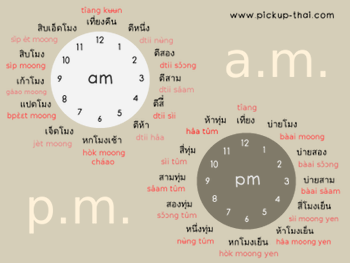
Choose the right resolution for your screen, and right-click on the image to save it to your computer.




Vocabulary
วันจันทร์ [wan jan] Monday
พระจันทร์ [prá jan] The Moon
วันอังคาร [wan angkaan] Tuesday
ดาวอังคาร [daao angkaan] Mars
วันพุธ [wan pút] Wednesday
ดาวพุธ [daao pút] Mercury
วันพฤหัส [wan páréuhàt] Thursday
ดาวพฤหัส [daao páréuhàt] Jupiter
วันศุกร์ [wan sùk] Friday
ดาวศุกร์ [daao sùk] Venus
วันเสาร์ [wan sǎo] Saturday
ดาวเสาร์ [daao sǎo] Saturn
วันอาทิตย์ [wan aathít] Sunday
พระอาทิตย์ [prá aathít] The Sun
Remark: The colors of the planets in the graphic are based on the colors assigned to each day of the week, not the actual colors of the planets.…
Continue reading Wallpaper 7: Days and Planets







